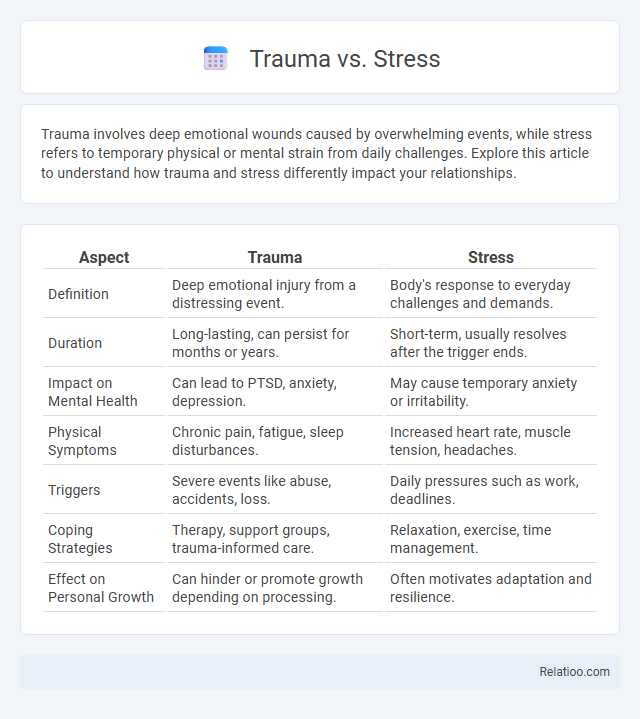Trauma involves deep emotional wounds caused by overwhelming events, while stress refers to temporary physical or mental strain from daily challenges. Explore this article to understand how trauma and stress differently impact your relationships.
Table of Comparison
| Aspect | Trauma | Stress |
|---|---|---|
| Definition | Deep emotional injury from a distressing event. | Body's response to everyday challenges and demands. |
| Duration | Long-lasting, can persist for months or years. | Short-term, usually resolves after the trigger ends. |
| Impact on Mental Health | Can lead to PTSD, anxiety, depression. | May cause temporary anxiety or irritability. |
| Physical Symptoms | Chronic pain, fatigue, sleep disturbances. | Increased heart rate, muscle tension, headaches. |
| Triggers | Severe events like abuse, accidents, loss. | Daily pressures such as work, deadlines. |
| Coping Strategies | Therapy, support groups, trauma-informed care. | Relaxation, exercise, time management. |
| Effect on Personal Growth | Can hinder or promote growth depending on processing. | Often motivates adaptation and resilience. |
Understanding Trauma and Stress
Understanding trauma involves recognizing it as a deep psychological wound caused by overwhelming events, whereas stress is a natural response to everyday challenges and pressures. Trauma can lead to long-term emotional disturbances and requires specialized care, while stress often triggers short-term physiological or emotional reactions manageable through coping strategies. You can improve your mental well-being by distinguishing trauma's lasting impact from stress's temporary effects and seeking appropriate support when needed.
Defining Trauma: Key Characteristics
Trauma is defined by its intense emotional impact resulting from exposure to events that exceed an individual's capacity to cope, often involving actual or threatened death, serious injury, or sexual violence. Unlike regular stress, trauma disrupts normal functioning and leaves persistent psychological effects such as flashbacks, anxiety, and emotional numbness. Key characteristics of trauma include its sudden onset, severity, and the profound impairment in emotional, cognitive, and physical well-being that may require professional intervention for recovery.
Understanding Stress: Types and Triggers
Stress manifests in various forms, including acute, episodic acute, and chronic stress, each triggered by different stimuli such as work pressure, relationship conflicts, or traumatic events. Understanding your specific stress triggers helps in managing the physiological and psychological responses effectively. Differentiating between stress and trauma is crucial, as trauma typically results from intense, overwhelming experiences that can cause lasting emotional harm beyond typical stress reactions.
Comparing Trauma and Stress: Core Differences
Trauma involves an intense emotional response to life-threatening or deeply distressing events, often leading to long-lasting psychological effects, whereas stress refers to the body's reaction to everyday pressures that can be either acute or chronic but typically less severe. Trauma significantly impacts your mental health by triggering symptoms like flashbacks or anxiety, while stress usually results in temporary tension or overwhelm that you can manage with coping strategies. Understanding these core differences is crucial for recognizing when professional help is needed to address deeper emotional wounds instead of common stress responses.
The Biological Impact of Trauma vs Stress
Trauma induces profound biological changes, including alterations in brain structure and function, such as reduced hippocampal volume and heightened amygdala activity, which intensifies emotional responses. Stress triggers the release of cortisol and adrenaline, mobilizing your body for a fight-or-flight response, but chronic stress can impair immune function and increase inflammation. Unlike stress, trauma can result in long-lasting dysregulation of the hypothalamic-pituitary-adrenal (HPA) axis, significantly affecting your mental and physical health.
Common Signs and Symptoms
Common signs and symptoms of trauma include intense emotional distress, flashbacks, and persistent nightmares, often accompanied by physical reactions like rapid heartbeat or sweating. Stress typically manifests through irritability, difficulty concentrating, muscle tension, and sleep disturbances. Your ability to recognize these distinct symptoms can aid in seeking appropriate support and effective coping strategies.
Short-Term and Long-Term Effects
Trauma and stress affect the body and mind differently, with trauma often causing more severe short-term effects such as shock, confusion, and intense emotional distress, while stress typically triggers temporary symptoms like irritability and fatigue. Long-term trauma can lead to chronic conditions such as PTSD, anxiety disorders, and lasting changes in brain function, whereas prolonged stress may result in cardiovascular issues, weakened immune response, and mental health challenges. Understanding these distinctions helps you recognize the appropriate interventions needed for recovery and resilience-building.
Coping Strategies for Trauma and Stress
Effective coping strategies for trauma and stress include mindfulness practices, cognitive-behavioral techniques, and seeking social support, which help regulate emotional responses and promote resilience. Trauma often requires specialized approaches like trauma-informed therapy and grounding exercises to address deeply rooted psychological wounds, whereas stress management focuses more on lifestyle adjustments such as regular exercise and time management. Your ability to identify the specific nature of your experience enables tailored coping mechanisms that improve mental health outcomes.
When to Seek Professional Help
Experiencing symptoms such as persistent anxiety, nightmares, flashbacks, or difficulty functioning in daily life indicates that trauma or stress has exceeded your coping abilities. When physical symptoms like insomnia, headaches, or heart palpitations coincide with emotional distress lasting more than a few weeks, professional intervention is crucial. Seeking help from a licensed therapist can provide targeted treatment strategies to navigate trauma and chronic stress effectively.
Building Resilience and Recovery Paths
Trauma involves intense emotional wounds that disrupt psychological functioning, while stress represents everyday pressures that challenge coping mechanisms; understanding these distinctions is crucial for effective resilience-building strategies. Implementing evidence-based recovery paths such as cognitive-behavioral therapy (CBT), mindfulness practices, and social support networks enhances adaptability and emotional regulation following trauma or chronic stress exposure. Prioritizing personalized interventions accelerates healing, fosters post-traumatic growth, and strengthens long-term mental health outcomes.

Infographic: Trauma vs Stress
 relatioo.com
relatioo.com